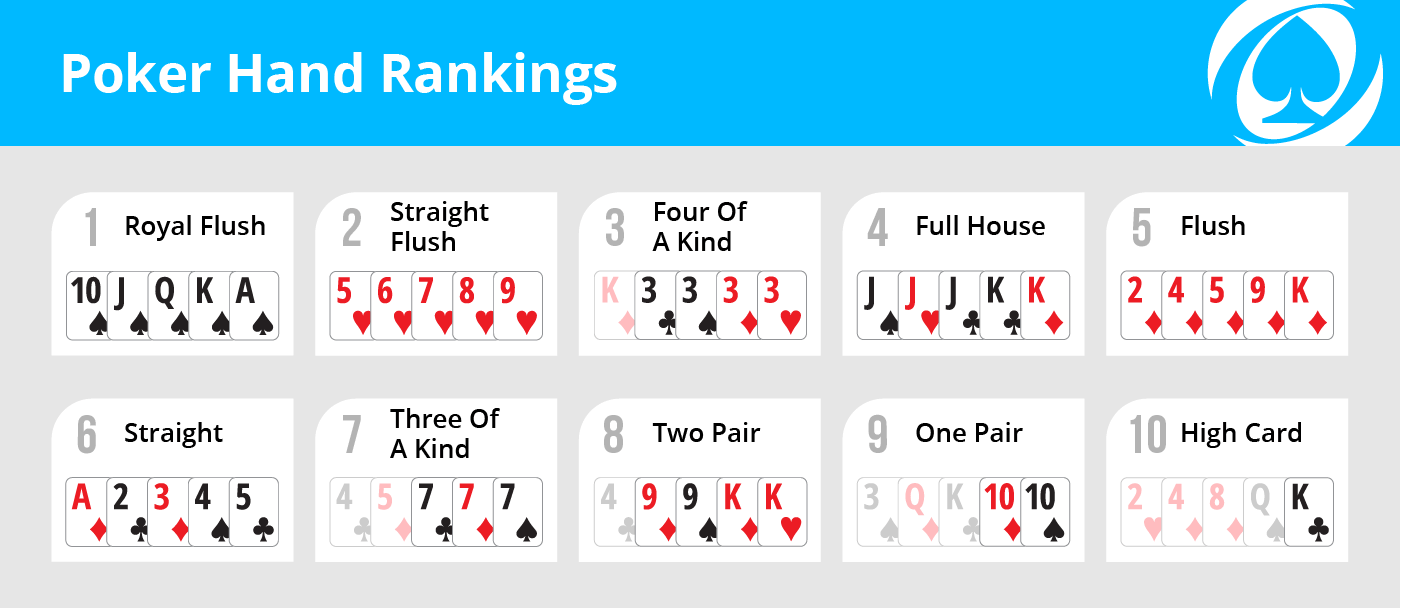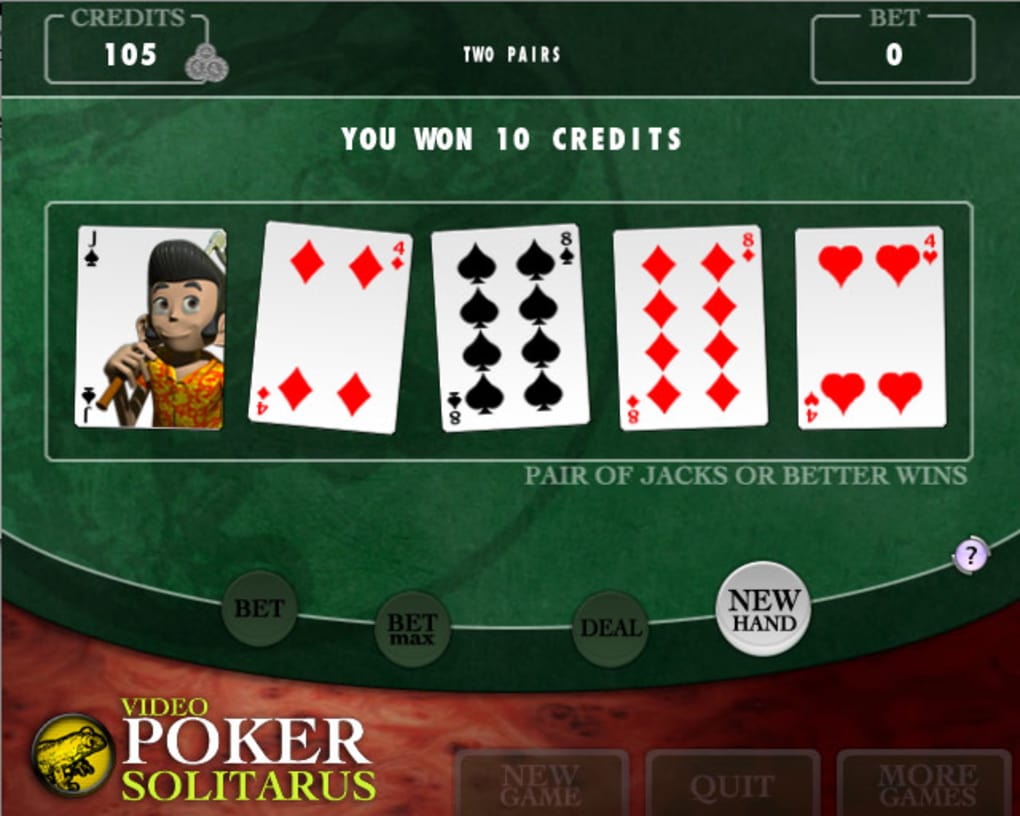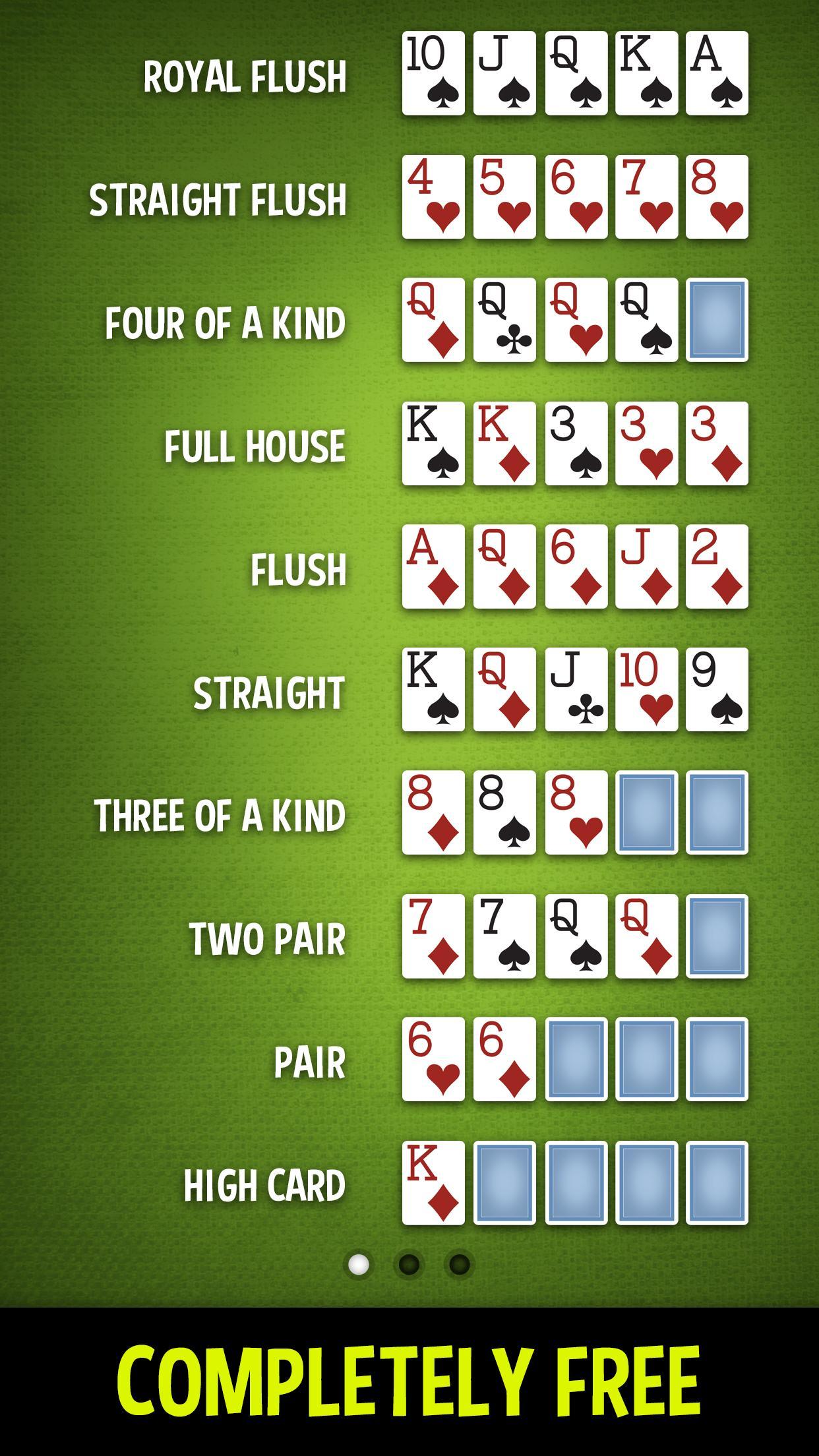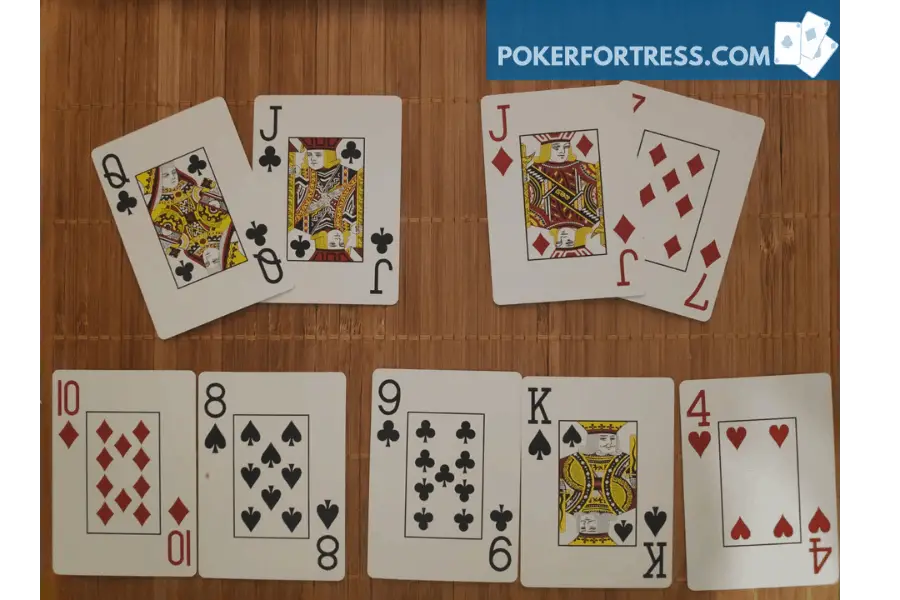Is A2345 A Straight In Texas Holdem
Straight draws are strong draws in Limit Texas Hold'em. When you flop a straight draw it's either going to be an open-ended using both your hole cards, open-ended using one of your hole cards or a gut-shot straight draw. The way you play your straight draw will depend on this. 1.10 Odds On the Flop in Texas Hold’em. 1.10.1 Outs; 1.10.2 Straight and Flush Draw Odds; 1.10.3 On the flop, when you have: 1.11 Odds of hitting a hand by the river from the flop. 1.11.1 On the flop, when you have: 1.12 All-in One-on-One in Texas Hold’em. 1.12.1 Preflop matchups when played to showdown: 1.13 Just-for-Fun Texas Hold’em odds.
It’s a weekend and you and a friend or family member are wondering if you can play a game of poker with just the 2 of you. I have been playing for over 10 years and can give you a definitive answer.
Can you play poker with 2 players? Poker can be played with only two players. It is called heads-up. Here are the two player rules:
This means the wheel (A2345) would register as a straight: a relatively high hand that would normally lose. The best hand in London Lowball is the A2346 (non-suited). Also the betting limits in.
- The dealer is the small blind and the other player posts the big blind. Players take turns being the dealer.
- The first card is dealt
to the player in the big blind. - The Dealer goes first before the flop and the Big Blind goes first after the flop.
Let’s cover a few more common questions that players typically have about 2 player poker in greater detail.
What Are the 2 Player Poker Rules?
Now that you are set up to play, let’s cover how to play 2 player poker. Here are the basic rules that you will need to know in order to play your game.
You may want to keep this page open in your browser in case questions come up during play.
1. How do the blinds work in 2 player poker?
How the blinds work is probably the most confusing thing in heads-up poker. However, once you get the hang of it it’s not that difficult to remember since there are only a couple of differences between 6-max or full-ring rules.
Who Is the Big Blind Who Is the Small Blind in Heads-Up Poker?
This is the most common question I get about 2 player poker
How Do We Determine Who Gets the Button First at the Start of the Game?
The easiest and most fair way to determine who gets to be dealer first is for each player to draw a card from the deck. The high card gets to deal first.
2. How Are the Cards Dealt in 2 Player Poker?
Which Blind Gets Dealt to First Before the Flop?
The big blind gets the first card and the dealer gets the second card in heads-up play. The easy way to remember this is that the dealer never deals to his or her self first.
Can the Same Person Deal Every Hand?
It’s true that sometimes one person is better at dealing. In this case, it’s okay for the same person to
Just make sure that you move the dealer button each hand. It would be highly unfair if the same person had to play the big blind every single hand!
3. Who Goes First When Only Two Players Are Playing?
I remember walking up to observe the heads-up match between two friends in pub poker. I quickly realized that they were following the opposite order of play that they were supposed to.
I did not want to embarrass them so I kept quiet. It was apparent everyone else didn’t want to as well since none of the 10-15 observers said anything!
Who Goes First Before the Flop?
Pre-flop, the dealer always acts first in 2 player poker.

This rule is exactly the same as pre-flop however, it is easy to get wrong for inexperienced players. The easy way to remember it is that the big blind player acts last before the flop in 6 or 9-handed games, and it makes
Who Goes First After the Flop in Heads-Up?
This rule is also exactly the same for normal poker games. The dealer gets to always go last on the flop.
The biggest perk of playing on the dealer button is that you get to act last and have more information than your opponents. This is especially powerful in heads-up since the big blind can never act last.
What If the Dealer Open Folds in 2 Player Games?
When the Dealer decides to not play his or her hand before the flop, the small blind is relinquished to the player in the big blind. The dealer button then moves and the next hand begins.
Is it better to play Heads-Up, Cash Games or Tournaments?
Deciding what format to play in 2 player poker all comes down to personal preference. Each type of game has its perks.
Why Play Heads-up Cash Games?

There are a couple of reasons people might choose cash games over tournaments:
- Blinds Do Not Rise – Perhaps the biggest benefit of 2 person cash games is that you don’t have to worry about the blinds going up like they do in tournaments. You don’t need a special tournament clock, you can just choose your stake level and play indefinitely without having to adjust your style to the rising blinds.
- You Don’t Need Poker Chips – In tournaments, you really need to use poker chips that you can “color up” as the game goes on. That means to add higher value chips to compensate for the bigger stakes. Instead, you can use real coins or even paper money to play cash games.
- Cash Games Take More Skill – If you really want to practice and improve at poker, then the best way is through cash games. Once the blinds rise in tournaments, the game becomes more and more about who is the luckiest person.
Why Play Heads-up Tournaments?
Even though I am a cash game specialist, when I play heads-up I actually prefer tournaments. Here is why:
- There Are Logical End Points – While cash games drag on and on, a tournament always ends up with one person having all the chips. You can then decide whether to start anew or call it a night. So, if you want to play best of 3 or best of 5, you have a better idea of when the night will end and can plan for it. For this reason, it’s also a great format for hosting a home poker tournament with multiple players.
- Tournaments Tend to Be Much More Exciting – There’s nothing more fun in poker than getting to the shove-fold phase of a tournament or sit and go. Chips change hands rapidly and anyone can win at that point. Who doesn’t love a race for all the chips?
- The Games Are Usually More Fun for Beginners – Many people that get into poker are used to watching the World Poker Tour or the World Series of Poker. Therefore, tournaments are what they are familiar with and likely to understand better.
If you don’t have poker chips, there are likely plenty of poker chip substitutes lying around the house or office.
A Fun Alternative Format: Play Short-Stacked Cash Games
Another idea is to mix both a tournament and cash game feel by playing short stacked cash games
The way it works is that each player starts with 20, 30, or 40 big blinds and then play cash games. The blinds do not rise, but there is still plenty of heavy pre-flop action with lots of reraise shoving
Post-flop also plays a lot easier as a short stack. Top pair is an easy hand to get all-in with when short whereas it can be difficult to play when deed-stacked.
What Is the Best 2 Player Poker Strategy?
The biggest adjustment when playing heads-up poker is that marginal hands go way up in value. 3rd pair or even high card Ace can often win at showdown.
So, loosen up and don’t let your opponent run you over if he or she bets a lot! Conversely, you should bet often when you have any piece of the board or a credible bluff. There is a good chance your opponent might fold a better hand or pay you off with a worse hand.
What 2 Player Games Can We Play Besides Texas Hold’Em?
If you are tired of heads-up No-Limit Hold’em and want to mix in another game occasionally, there are several good options:
- Pot Limit Omaha: In PLO, the heads-up rules are exactly the same as Hold’em except that both players get four hold cards. You also have to use both cards at showdown. Having one Diamond in your hand does not make a flush on a four Diamond board in PLO.
- 5-Card Draw: This is the traditional “old-fashioned” game that most people used to learn poker before No-Limit Hold-em became the dominant game. Both players have a designated ante that they pay before the cards are dealt. Then, you simply deal out 5 cards to each heads-up player. Instead of having a flop, turn, and
river there is instead two betting rounds. Once when you get your initial cards and then after adiscard round. You may discard up to 3 cards (4 if you have an Ace) and get those cards replaced by the dealer. There is then another betting round and then the cards are shown and a dealer determined. You can, of course, fold any time during the hand and only lose the money you have invested up to that point. - 7-Card Stud: This game is similar to draw except that you start with two cards down and one card up. There is then a betting round.
Afterward , another card is turned up one by one with a betting round happening in between. Once both heads-up players each have 7 cards, the dealing is complete and showdown can be reached.
Accessories to Make Matches Even Better
If you want to make your games more classy, then I recommend picking up quality accessories. I wrote recommendation articles for each category, just click the links to learn more:
- Playing Cards– My personal favorite is Copag, what’s yours?
- Poker Chips– I prefer a higher-end set, but there are plenty of good budget poker chip sets available as well.
- Poker Table– I like roll up poker table mats for ease of storage, but that’s just me.
Final Thoughts
Playing heads-up only happens in tournaments if you are the last two players left in the field. However, 2 player poker is something you can do for fun either as a cash game or tournament at home.
If you want to read more about heads-up poker, I wrote a detailed article on the heads-up poker rules for Texas Hold’em. Thanks for stopping by!
Related Questions
Do you have to use both cards in Hold’em? In order to make your best 5-card hand in Hold’em, you can either use both cards or just one.
Is Ace high or low in poker? In Poker, an Ace can usually either be the highest card or the lowest. It can make the highest straight of TJQKA and the lowest straight, often called the wheel, of A2345.
Do you have to match the big blind is poker? In order to qualify to see the flop, you must at least match the amount of the blind.
All-in – 'betting' or 'calling' with all of your chips. After going 'all-in', you can't participate in the next rounds of betting for that hand. If any more bets are placed after someone calls 'all-in', a side pot is created.
Ante – chips put into the pot before a hand is dealt. 'Ante' is usually used in tournaments to speed up the game.
Back Door – a hand that is made using cards drawn from the 'turn' or 'river'. If you use both the 'turn' and 'river' cards, then your hand is called a 'Runner-Runner'.
Bad beat – losing a hand (when someone was thought to be the favorite) before or after the flop has been dealt.
Bankroll – the amount of chips that you have in your account. The size of your 'bankroll' determines how high of stakes you can bet.
Broadway – a deal that could potentially complete 'a nuts straight' (AKQJT), for example: KQ.
Big Blind – a forced bet that's placed by the player who sits to the left of the dealer. It also determines the stakes for the table, the maximum 'buy-in', and the minimum raise amount.
Big stack – a player with at least 100 BB in the cash games or that has an above average stack in the tournament.
Big stack bully – the player with the biggest stack at the table that uses it to his advantage to bully the other players
Bluff – betting with a very weak hand but implying that you have a monster hand so that you can win the pot without a showdown.
Board – all of the community cards on the table.
Is A2345 A Straight In Texas Holdem Real Money
Button – the button (a small, round disk) is given to the player who bets last after the river is dealt (in other words, the dealer), therefore he/she has the best position at the poker table.
Buy-in – the amount of chips paid for entering the game, both in tournaments and cash games.
Call – calling the bet and putting the same amount of chips into the pot.
Calling station – a passive player that wants to see the flop and other streets as often as possible, even if his hand is very weak.
Check – if no one bets before you, you can check and pass to next player, without betting.
Check Raise – a play in which after checking on your turn, someone raises the next bet. Usually used to bait players to put more into the pot, while holding a very strong hand.
Coin flip – a situation in which both players have very similar odds of winning the hand, for example AK vs QQ.
Combo draw – drawing for multiple hands at the same time, for example: a flush and a straight.
Community cards – the cards that are face up on the table and belong to all of players.
Connectors – two cards that are one apart in rank, for example: 8 and 9.
Crying call – a desperate call when you are almost certain you have the worst hand.

Cut off – the position at the table that is to the right of the dealer. One of the last positions taken.
Dominant hand – a hand that is dominated by your opponent, usually by holding one of your outs and a higher kicker, for example: AK dominates KQ.
Donkey – a very weak player that is mostly losing.
Draw – the possibility of greatly improving your hand and creating a monster hand with certain cards that might be dealt on later streets.
Drawing Dead – a player that can't possibly improve his hand and win the pot.
Early position – usually the first three positions at the table, the worst positions to be in.
Fish – a very weak player that can only win with luck, not skill.
Flop – the first three community cards.
Flush draw – whenever a player can improve his hand to flush on the later street, he has a flush draw.
Fold – giving up the pot after a bet and mucking your cards.
Freeroll – free-to-enter tournament, a great way to build up your initial bankroll.
Freeze-out – a type of tournament without re-buys. When you lose all of your chips, you are eliminated.
Full ring – tables with 9 or 10 players.
GF – good fold. Used whenever one of the players makes a very good fold.
GG – good game, a greeting used to thank others for the game.
Gutshot – a draw in which we need exactly one card to complete a straight. For example: AKQT needs one of the jacks to complete a 'broadway'.
Heads-Up – a 'one-on-one' poker game.
Isolating – raising to minimize the amount of players involved in a hand, making it more likely to able to play 'Heads-Up'
Kicker – one of the cards in your hand that isn't used to complete your hand, but it could determine whether or not you win the pot.
Late position – 'button', 'cut-off', and the position to the right of these two, which makes them the best positions the table.
Leak – making the same mistake over and over that causes a player to lose more chips in a long run.
Limp – calling the 'big blind', a very passive play.
Loose – a term used to describe a player that plays a lot of hands, even the weak ones.
Maniac – an overly aggressive player.
Middle position – one of the middle positions at the table.
Monster – very strong hand that is a heavy favorite to win the pot.
Muck – A pile of all the folded cards, or to not show your hand at the showdown when you have been beaten.
Nh – nice hand.

Nuts – the best possible hand in certain situations.
Is A2345 A Straight In Texas Holdem Rules
Offsuit – pocket cards of different colors.
Open Ended Straight Draw – a hand that can complete a 'straight draw' using higher or lower sequential cards, for example: 'KQJT' can have either an 'ace' or a '9' added to them to form a 'straight draw'.
Out – a card that could come up on the table which would greatly improve your hand and let you win the pot.
Overbet – betting a very high amount that greatly exceeds the pot.
Overcards – pocket cards that are higher than any other card on the table, for example: AK with the 6,4,5 flop.
Overpair – a pocket pair that is higher than any pairs on the table, for example: JJ with the T74 flop.
Passive – a way of playing in which the player is mostly checking and calling, allowing the others to take the initiative.
Pocket Cards – two cards dealt to you by the dealer.
Pot limit – a type of poker game in which the maximum bet is the same size as the pot.
Pre-flop – the first round of betting, before the first community cards are shown.
Rags – worthless cards, usually after the flop or during later streets.
Rainbow – community cards that are different colors and make it impossible to form a 'flush draw'.
Re-raise – raising a raise. A very aggressive tactic, usually used when a player has a strong hand.
Rebuy – adding chips to your stack after losing some.
River – the final and fifth community card.
Satellite – a tournament in which the prizepool are tickets to better tournaments.
Short stack – a player who doesn't have very many chips at the table.
Showdown – the final stage of the game, when players reveal their cards to determine the winner.
Sit and go – a tournament that begins when the required amount of players registers.
Sit out – taking a break from the game.
Short handed – tables with a maximum of 6 players.
Slowplay – a passive play used by a player with a very strong hand to bait other players into putting more in the pot and to get more value.

Small Blind – a forced bet, equal to half of a 'big blind', placed by player to the right of the player who executed a 'big blind'.
Suited – pocket cards of the same suit. For example: AJ of diamonds.
Suited connectors – connectors of the same suit, for example: the 8,9 of clubs.
Stack – the amount of chips you have on the table.
Steal – raising from a late position with a weak hand to force 'blinds' to fold.
Straight draw – a hand that can be improved to form a 'straight'.
Tight – a way of playing where the player 'raises' and 'calls' with only strong hands and folds his/her weak ones. This is one of the most effective strategies.
Tilt – a player's mental state after losing one or more hands in a very unlucky way. Having the 'tilt' can cause you to play much worse and taking a break to cool off is strongly advised.
Top Pair Top Kicker – a hand in which you have the possible pair on the table with the best kicker. For example: AJ on J28 flop.
Turn – the fourth card put on the table by the dealer.
Ty – thank you.
Under The Gun – the first player to act 'pre-flop'.
Underdog – a hand that is dominated by another hand and has very low odds of winning. For example: KK vs AA.
Value bet – a bet in which the goal is to increase the size of a pot and take more chips from other players while holding a very strong hand.
Wheel – the lowest straight possible: A2345.
WP – well played.